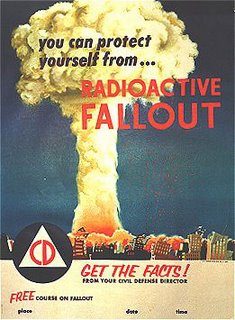
Today Jeb Bush, governor of Florida, in a sense blamed the Floridians for being short on food and ice. This sounds harsh but remember, these are the same people that probably have no spare tires or tools in their vehicles, haven't taken Red Cross safety courses, or checked their smoke alarms regularly. I myself have always been fascinated by emergency preparedness and disasters- not like I was in grammar school when "Jaws" and "The Towering Inferno" came out, though. Preparedness can mean the difference between life and death in many cases.
The governor advises three days of food and ice and other provisions. In the time leading up to a disaster this isn't the best last-minute purchase. I advise expanding on FEMA's guidelines and putting two additional days' supplies aside.
My ideas of preparedness are:
-Be sure the gas tank is full and fluids as well as tires checked in your vehicle.
-Store five days worth of food to supply 3000-4500 calories per adult.
MRE's, one per person per day at least. A family of three should get two cases of 12. The MRE is the same food soldiers eat in the field. Their advantage over canned food and freeze-dried food is not needing preparation or water. These can be stored in 70 degree temperature for five years. If you freeze them do NOT refreeze them or handle them roughly. You can get these from various internet resources. You can get various entrees and side items from MRE's separately.
Canned food lasts six months in most instances. Survivalist versions of canned food last well over a year in some cases. Just be sure to have a nonelectric can opener. You will need some paper plates, tin foil, bowls or mess kits, and drinking cups if you do this. Get a canteen cup or other cookware for heating your food.
Freezers can store all but bread effectively (mushy when thawed). When power goes out remove the items you need. A freezer can keep food good for two days without power. Store dry foods here. Good items requiring at the most just warm water are instant cream potatoes, crackers, powdered milk, cereals and trail mixes, dehydrated fruit, oatmeal, and granola bars. Expect to change these out every year. You will need instant tea, coffee, cocoa, or fruit drink in powdered form. Canned juice should last six months or a year.
You need a heat source such as propane stoves, trioxane bars, or MRE water-activated heaters. Just DON'T use them indoors unless there is adequate ventilation. Flammable gels are a viable option (Purel, for example). An old can with holes punched in it makes a good stove. Just be fire-safe.
-Store at least one gallon of water per person per day. Except for bottled water you should drain the water and replace it every six months. Put a few drops of chlorine bleach in the containers.
-Get copies of extremely vital documents and financial account information. Have extra medications and provisions for special health needs on hand. Have contact numbers for family members.
-Non-food supplies to have on hand are a shovel, hatchet, knife, rope, first aid kit and medicines for minor illness, small hand tools, trash bags, plastic Ziploc bags, two tarps, a tent, rescue or space blankets, flashlight, radio, extra batteries, matches, a compass, maps of the state and US, three changes of clothing, extreme weather clothing, paper and pencil, books and games, toiletry items, towels, a sleeping bag, and other items your emergency management agency specifies.
-You will need buckets with lids, duffel bags, and most certainly a backpack for these. Government surplus houses have good prices on backpacks.
-Learn survival skills for a disaster. Check "Are You Ready" at www.fema.gov. Various military documents provide information on how to deal with the cold and other "camping" information. Your military is the largest group of professional campers. Learn CPR and first aid by enrolling in courses hospitals, the Red Cross, and fire departments hold in your town.
This is not meant to be a total list but this should make Jeb happy.
KAT


3 comments:
Nice blog, have you heard about the new walmart movie that documents the high cost to low price? Check out the sample clip on my blog www.thoughtsoft.blogspot.com, or go to walmartmovie.org
Thanks
I agree with you that we need to be prepared for disasters. When the flood happened in 1994, I filled the washing machine with water, and the bathtub. The water came in handy when we had none! It took at least 2 days before we were able to go to fire stations, etc to get our water.
I am going to be better organized. Thanks for the list and suggestions.
Kat,
Why don't we create a kool-aid drinkers' blog, and maybe the fools will come add their names to it? Ha!
Post a Comment